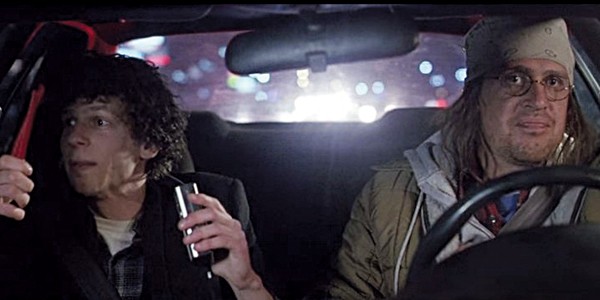The End of the Tour opens on the day in 2008 when David Foster Wallace hanged himself. Journalist David Lipsky (Jesse Eisenberg) is heartbroken by the news. After being called upon to eulogize Wallace on NPR, he digs out some cassette tapes of an interview he conducted with the writer in 1996, when Wallace had burst onto the international literary scene with his novel Infinite Jest.
Director James Ponsoldt then flashes back to 1996, when Lipsky, then a reporter for Rolling Stone and a fledgling fiction writer himself, reads a rave review of Infinite Jest. “It’s as if Paul Bunyan had joined the NFL,” says the reviewer of Wallace’s talent. Lipsky is skeptical. Infinite Jest can’t be that good, can it? But then he buys the book, and a hundred pages into its thousand-plus pages (the last 95 or so are taken up with footnotes), he realizes, yeah, it really is that good. He convinces his editor to let him do a profile on Wallace. To get a sense of who this incredible talent is, he travels with Wallace for five days, starting off at his snowbound home in Normal, Illinois, where he was a writing teacher at Illinois State University. They then fly to a reading at a Minneapolis bookstore called the Hungry Mind, where Wallace is greeted by rabid fans, hooks up with some old school friends, and visits the Mall of America before finally returning home.

Jesse Eisenberg and Jason Segel
That’s pretty much the entire plot of The End of the Tour. As a man in the audience at the screening I attended said, “It’s just a couple of guys babbling at each other.” Well, yeah, but so was Beckett. These days, when screenwriters and editors are given the assignment to cut down a film’s length, the first thing they do is cut dialogue. If beautiful prose is replaced with bare-bones exposition, so be it. Let’s just get to the explosions quicker. But not this film, which is based on Lipsky’s 2010 memoir Although of Course You End Up Becoming Yourself, the bulk of which was verbatim transcripts of the hours and hours of tapes Lipsky recorded on the trip. The plot tensions — the “oh no, what’s he gonna do next?” — are minor and minimal. But the dialogue is scintillating, and even more fascinating because you know most of it was really spoken by the greatest writer of his generation. Quotable lines come thick and fast: “There’s good self-consciousness, and then there’s paralyzing, raped-by-psychic-Bedouins self-consciousness.” And “I don’t think writers are smarter than other people, they’re just more compelling in their stupidity.”
Wallace is played by Jason Segel, the Freaks and Geeks alum who has had a decent but understated career in comedies such as Knocked Up and Forgetting Sarah Marshall. I didn’t think he had the depth to play Wallace, but, boy, was I wrong. He’s got Wallace’s hulking physicality and intense mannerisms down pat, and with the trademark bandanna (“It keeps my head from exploding”) firmly in place, he fully sinks into the writer’s persona. He’s incredibly intimidating and approachably humble. Confronted with over-the-top praise for Infinite Jest he says, “It was the best I could do between 1992 and 1995.”
This is the best two-hander I’ve seen in recent memory. I wouldn’t be at all surprised to see The End of the Tour lauded by the Academy with acting and writing nominations come January.
Would Wallace himself like this film? Probably not. He and Lipsky bond over their love of Die Hard, and they drag some girls to see the John Travolta stinker Broken Arrow. But if you’re a fan of Wallace’s work, or if you just like good writing, The End of the Tour is a must-see.